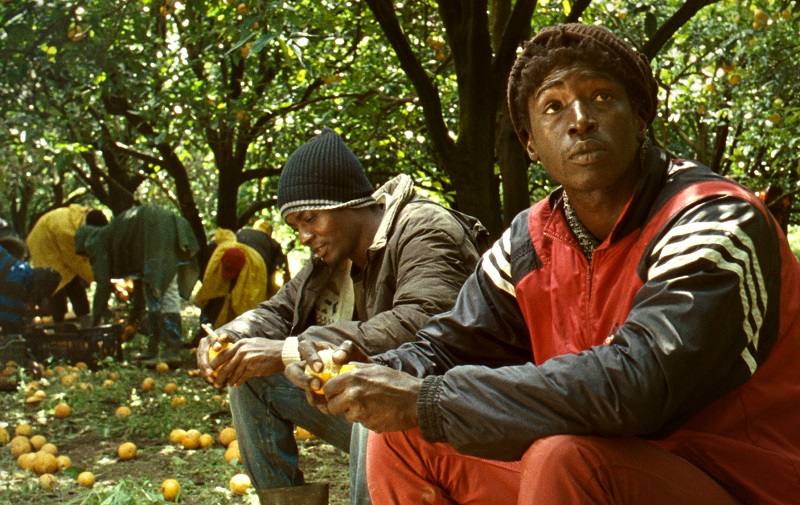
On Friday 16th of October, I went with my film and media class to watch a screening of Mediterranea at the BFI Film Festival in Brixton. This took place in a small arthouse cinema called ‘The Ritzy’ and it was followed by a short question and answer with the director, Jonas Carpignano who gave some useful information about the production of the film and on the characters which I found very intriguing. This was Carpignano’s first feature film but he has previously directed five short films: La Casa d’Argento Bava (2006), Resurrection Man (2010), Bayou Black (2011), A Chiana (2012) and A Ciambra (2014). A common similarity that I noticed between most of these films and Mediterranea is that they show the journey of the protagonist(s) and at times, the narrative is based upon the director’s historical and cultural background. Due to this being his first feature and the actors being unknown, the director explained that it was difficult to fund the film and that he had to go to about five different production companies. Jonas Carpignano also wrote Mediterranea and it was produced in 2015 with End Cue and it was first released on September, 2nd in France. The music was by Dan Romer, the director of photography was Wyatt Garfield, the editing was by Sanabel Cherqaoui, Affonso Gonçalves and Nico Leunen and the production design was by Marco Ascanio Viarigi.

Starring: Koudous Seihon (Ayiva),
Alassane Sy (Abas), Pio Amato (Pio), Annalisa Pagano (Cristina Riso), Sinka
Bourehima (Ahmed) and Davide Schipilliti (Rocco), Mediterranea is a social
realism, documentary drama which looks at the dangerous life of refugees and it
follows the journey of Ayiva and Abas as they make their way from Africa to
Italy in the search for a better life. What stood out to me most in the
narrative was the huge sense of realism which gave me a true insight into the
migrant experience regarding their fear, exploitation and survival.
Mediterranea developed from Carpignano’s short film, A Chiana which looks at
the real-life events and characters leading to the Italian riots and it focuses
on the story of Ayiva who of course is the main protagonist in Mediterranea.
The cast for Mediterranea is un-professional and Carpignano explained in his
Q&A that he met most of them in the small town he has spent a large proportion
of his life in, meaning that what is seen in the film are their actual stories
so it is a completely honest reflection of the events they have experienced in
their lives so far. This really added to the realism of the film and it wasn’t
until after that we were told the vast majority of the film was based upon true
stories which I thought would have been good to know before so I could have
emphasised with the characters to an even larger extent. However, I did feel a
strong connection with the characters, especially Ayiva throughout due to such
strong, emotional performances and after finding out that they are
un-professional actors, I was even more impressed because they had such a
powerful delivery.


The cinematography also added to
the realism of the film because it was all filmed using handheld camera. I
believe the director did this to represent how the lives of the migrants in
this film are not constructed or carefully placed into a scripted narrative but
instead, they are gritty and real. The camera was also quite shaky at times
which symbolises how the characters journeys and experiences were unstable and
they were forced to go through terrifying and emotional events which ‘shook
them up’ meaning they have not been able to get their lives under control.
Regarding the cinematography, there were some absolutely beautiful shots
throughout Mediterranea, such as the amazing ocean shot below, with the strong inclusion of bokeh behind the
night-life scenes which I found truly stunning and I believe Carpignano
included this to represent how although the characters are constantly
surrounded by harshness and negativity, they can still look to find the good
and beauty in their situations. There was a recurring extreme close up shot
that was used of Ayiva and Abas each time they reached a new location and this
was an effective way of documenting their journey because the audience were
able to see their reactions which were often a look of fear and helplessness
because they were completely unsure of what to expect.


In conclusion, I really enjoyed
Mediterranea because at times, the narrative was very emotionally moving and I
was able to gain connections with a lot of the characters. The messages touched
upon were clearly close to the director and a lot of passion and heart-felt
emotion went into making Mediterranea which was definitely reflected
throughout. Although I found the ending slightly confusing due to the ambiguity
and enigma codes that it left the audience with, it was still very effective at
expressing the main theme of ‘personal journeys’. The cinematography was
incredible, the performances were outstanding and I am going to rate this film
7.5/10. It was not my favourite film from the collection I have watched at the
BFI Film Festival (Ayanda was my favourite) but it was definitely impactful and
I would encourage others to watch it.

^ The Director- Jonas Carpignano
No comments:
Post a Comment